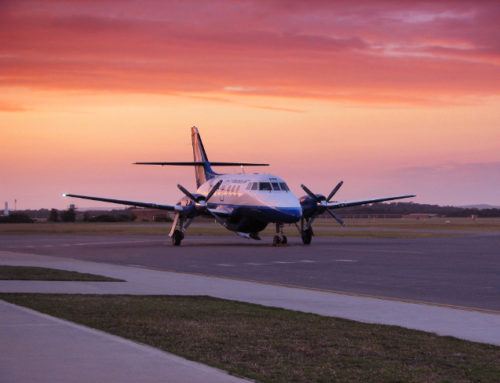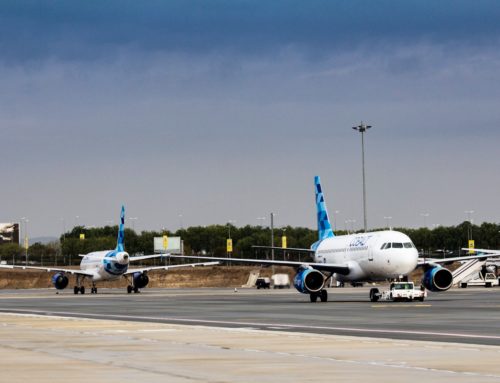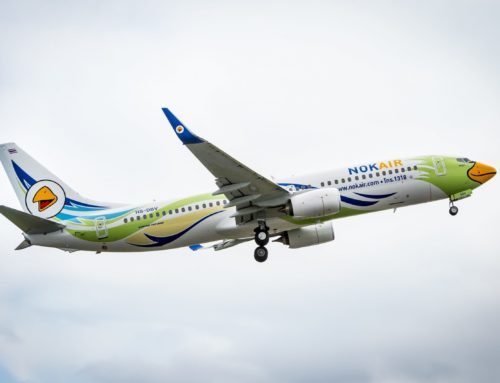Dana Air is a privately-owned Nigerian carrier using a fleet of five MD-83s to operate scheduled passenger services between Lagos, Abuja, Port Harcourt Omagwa, Uyo, and Owerri. In 2012, it experienced a devastating crash but has since returned with a renewed commitment to safety, punctuality, and a high quality of service. ch-aviation’s Chief Executive Officer, Thomas Jaeger, spoke with Dana Air’s Chief Operating Officer / Accountable Manager, Obi Mbanuzuo, during the recent APG World Connect in Monaco to learn more about the airline’s status quo, business plan, and the state of the Nigerian market in general.

THOMAS: Dana Air has one route which generates more than 50% of its revenue, Lagos to Abuja. Could you maybe tell us a bit more about what the passenger mix is in the market, and how you position yourself versus your competitors? Because it’s obviously also the most contested route in Nigeria, not to mention one of the busiest ones in Africa in general.
OBI: Of course, in my opinion, we think we’re number one in terms of service! *laughs* There are airlines that are bigger, airlines that have more frequencies, airlines that have more airplanes, but we always tend to fall within the number one category, because when you go back in our history, this is now going to be the ninth year that Dana Air has been flying since 2008. We had a very ugly accident in 2012. And very few airlines historically, in Nigeria, have recovered from an event of that magnitude. And we were able to do so because we went back to basics; giving our passengers the right service and making sure as much as possible, that even in the event of weather or technical issues, we always make sure they are taken care of. And that’s why even after of what happened we’ve come out of it, we’ve strengthened our technical and operational capabilities, ensured that everything is right on the money. But the basic thing is what we’re giving the customer. Now that has helped drive people back to us. And when you talk about Lagos-Abuja, it is a route that gives us about 50% of our revenues and helps us survive. When we went back in there, in 2013, there was still Aero (Contractors) and Med-View was just starting up. In fact, there were more competitors than now. So, we had to go in and show what we could do. That route is really a corporate service; neither Lagos nor Abuja are leisure towns. Lagos, as you know, is the commercial capital. I think right now there must be 20 million+ residents in Lagos. Abuja is where the government is based. So, if you’re in business or in government, you have to go between Lagos and Abuja.
Aside from corporate traffic, we recently concluded a deal with the Nigerian government, so a lot of their traffic comes through us. So, in reality, we always see ourselves as number one in terms of service and punctuality. Punctuality is where we’re 100% sure we’re Number 1 as in that respect, we are at least right now doing 87-90% OTP, even with all the structural problems that exist. A good example is whenever any government VIP aircraft moves, everything is forced to shut down. We can’t plan for that, but we always try and make sure we do everything we can. Right now, there’s a serious fuel issue in Nigeria which is affecting businesses in general. It affects us as well, but we have extra people on the ground working to make sure that we provide this service. I mean, all the senior executives, we all go on the ground and do the things that we need to. I go on the ground myself to push things, to get passengers checked-in on time. For us, it’s our service and punctuality that sets us apart from the rest.
THOMAS: What is the booking curve like for the Lagos-Abuja market and, from a distribution perspective, how are you selling the route to corporates nowadays? Have payment methods evolved in Nigeria in recent years?
OBI: Frankly, the market’s changed quite a lot. Even if I go a bit further back, 10-15 years ago, people would simply rock up at the airport counter and pay cash. There was probably very little computerization, everything was done on a sheet of paper. So, when I joined, computerization, automation, the advent of price estimation, all that came into being. For Dana Air, 55-60% of our ticket sales go through our website. For us that’s an efficient way of selling, we like that, but again, from the commercial perspective, we want to have as many windows open as possible. So, we do trade with travel agents, in the BSP (Billing and Settlement Plan) Nigeria, and as I just mentioned, we also have a government deal. So, it’s a mix. Dana Air does not focus on just the one side, just as you said. We’re like a market window, a shop window, we open as many windows as possible.

Dana Air MD-83 © Dana Air
THOMAS: So, are people booking further in advance nowadays? Or is it that one week out, all of your flights still show up as empty?
OBI: Yes, they are booking further in advance, but it’s still not as evenly distributed as we would like. One week out, flights are all empty, but now, we’re seeing movement in the last, say, 42 hours. With our revenue management guys, we already know more or less what is going to happen and we can now anticipate what happens. On the other hand, as well, there can be a lot of movements in the market even on the day of operation. So, you find that one carrier cancels, or it’s suddenly delayed and all of a sudden, there’s a surge in demand. Then if we decide that we can handle that, then we don’t have to scramble to look at how we can put in extra capacity. So, we do a lot of ad-hoc additions, we rarely cancel and remove. For Dana Air, it’s very rare. But we try to absorb any excess demand that happens to arise on the day, if we can. But yeah, the booking curve is still very late, but I would say it is now a lot better than it was before.
THOMAS: So, obviously there’s been a lot of changes in the Nigerian market in the last year or two, so first Aero came under the control of AMCON followed by Arik. How has this actually affected you as a competitor?
OBI: Well what has happened is, since these events occurred, people have come to realize that the reliability that we provide is crucial. Before Dana Air got its IOSA certificate, corporates, because of their travel policies, could only travel with IOSA-certified carriers like Aero or Arik Air. But, with our certification, we have now been able to offer ourselves as an alternative. And people who have tried us have liked our service. And even for those accustomed to flying on a Boeing or an Embraer, our McDonnell Douglas jets have shown they are wonderful airplanes. But while Arik’s and Aero’s problems have affected us positively in some respects, their issues are a result of structural problems in our market – government policy concerning airports, ATC, as well as foreign currency shortages – and they affect us as well. Fuel is also a factor as Nigeria imports 100% of its jet fuel requirements. So, we aren’t complacent. We’ve seen what these issues have done to Nigeria’s once great airlines and we are determined not to let them happen to us. At present, government is receptive but there are a few agencies we are lobbying to have made more efficient – airport operator FAAN, ATC etc.

© Dana Air
THOMAS: Given these issues, how is your aircraft utilization?
OBI: Dana Air currently gets about 7.5-8 hours utilization of our aircraft, which in the Nigerian context, is a lot. Few people can get more than five hours. We could get more if we flew into West Africa at night time, but we could actually do more domestic flights, if the airports had better infrastructure and manned ATC. Most airports don’t have runway lights, so they are just dawn-to-dusk facilities.
THOMAS: If you look at everything that you just said, obviously Nigeria is one of the biggest domestic markets in Africa, but it’s not a low-cost environment at all. What are the four or five key cost drivers that make it so expensive to operate?
OBI: Well, the first thing we get from the point of view of the airline, it’s the Cape Town Convention. It’s been ratified but it hasn’t been implemented. So, the first is, as an airline operator, when you go out to lease an airplane, it’s very difficult to get an aircraft from a lessor at preferential rates. We also have to source funding, most of the time, from outside the country because banks and finance houses here don’t know much about aviation. If you can get local financing, usually it’s with short repayment windows and high interest rates. Also, infrastructural issues, as i mentioned just now, also affect us a lot. Airports, fuel and foreign currency availability, they affect all of us in the industry. We also operate in a very high tax environment. It’s very hard to run a low-cost operation, because domestic airlines in Nigeria pay VAT while international operators don’t. So those are some of the factors that inhibit the start of low-cost operators. But despite this all, Nigeria has got potential. It has got almost 200 million people. Last time, it was about 190 million or something like that. But every year, the traveling public is growing.
THOMAS: What about all these stalled projects in which government and local operators have announced plans for MRO facilities to undertake C and D checks. Has there been any progress on that front?
OBI: Well, recently Aero undertook its first series of C Checks on a B737. So, this is a development we’ve watched with keen interest because being able to undertake our maintenance requirements locally, would help us, it would help everybody. Right now, we have to fly to Europe/the Middle East for our heavy MRO needs.
THOMAS: What are your fleeting plans? You mentioned financing just now, so I assume one of the things you’re looking at is how you will eventually replace your MD-83 fleet. I know in the past you talked about B737-800s, and you looked at B737-500s from EgyptAir at one point. So where are you right now and what direction are you heading in?
OBI: The MDs have actually been very good airplanes for us. We know them very well and we are going very well. We have currently, I think, a 99.97% dispatch reliability, but, as you know, they’re getting old. We have done in-house studies as to what kind of airplane we would like to use as a replacement. It tends to come back to the B737-700. The -800s are a good mix for Abuja, but it’s slightly too big for one or two of the other markets we operate, so it might work better to use a -700 and just put more frequencies. And as I said, yes, we are talking to one or two people about financing, but this is something that is a medium- to long-term plan, i.e. end of 2018/early 2019. And the idea is really to keep flying the MDs for a while, because they’re good for us. Or what we may do initially, if you get any new aircraft, we might be able to add, to increase capacity, may be a year or two down the line. When the MDs start needing heavier checks, then we’ll start phasing them out on a one-for-one basis. It’s not going to be a complete fleet overhaul in one go, it’ll be gradual. So, I suspect the MDs will still be around for another four years or so.
THOMAS: Have you looked at smaller aircraft? Aero and Arik Air both had a sizeable fleet of turboprops, with Arik Air also having a small regional jet fleet. You came from Virgin Nigeria yourself, so obviously you have regional jet experience as well. So, are they something you’re looking at for smaller airports?
OBI: We have looked at that, but what always comes to our mind for Dana Air are the issues associated with operating multiple types. The complexity is not something we’d really want given the added costs that come with it. But, we have looked at smaller types, albeit more as temporary solutions. So, there’s a temporary solution we’re looking at with more of the state governments, where probably we’ll wet-lease an airplane to operate for some time for a particular need. But it isn’t something I would try integrating into our fleet. We want to keep it as simple as possible.
THOMAS: Could you tell us a bit more about the business model for Imo Air, your partnership with the Imo state government. How did you come up with the project and how does it work? And what is different between Imo Air and Dana, and how does it work commercially?
OBI: Well it is really more like a partnership with the Imo state government. They approached us as they felt that they could tap into local tourist demand. It’s simply that every state tries to differentiate itself from the others. So, if you look, Lagos is a big commercial hub, but then you go to Cross River State, you have Calabar which sees huge tourist demand and Akwa Ibom has oil. So, Imo State thought, you know what? We’ve got nice places that we could bring people to, but how do you do that? And they felt that we could work with an airline to bring people there. It’s more a partnership, where they’ve made an investment in Imo Air, for which we then do the marketing. It doesn’t have an AOC however. But we have some say in how we serve their region and their state. At present, we operate into Owerri from Lagos and soon, from Abuja, and I think we may need to use smaller airplanes if we start flights from Owerri to Asaba.

© Dana Air
THOMAS: You tried the international market briefly serving Accra, Ghana. What was the key reason the route didn’t work for you?
OBI: As you probably know, Accra was one of our business routes. All I can say at the moment is that we were not operating with the right aircraft. As I said before, Dana Air prefers simplicity in its fleet type operating McDonnell Douglas’ with 140 seats. But the Accra market really needed frequency and smaller airplanes. So, we had difficulties in gaining traction because it was just a daily flight and we were competing with others that had smaller airplanes and higher frequencies. It was really difficult. So, we thought, we will come back to Accra but only when we have the right airplane. Another idea we have had is to spread out further into the West African market but using multiple point-to-point routes. And we’re also thinking about partnering with Ethiopian Airlines and ASKY via interlines and codesharing. This would then give the customer better connectivity.
THOMAS: Other than West Africa, are there any other markets that you’re seriously looking at given the massive market voids left by Arik Air? Med-View Airline and Air Peace have already announced plans to start flying long haul to Europe, the Middle East, Asia and so on. Is this something that you would even consider, or is that too big of a gamble right now?
OBI: I would honestly say, for Dana Air, long haul is a big gamble whose risk we aren’t prepared to take. As we are right now, Dana Air is looking at where we can operate with our current fleet or if we go with the B737-700/800. So, areas within the region, 3 hours flying time out of Lagos at the most. But there are so many options we have looked at that i wouldn’t want to say anything just now.
THOMAS: If you look at the international market, given your experience with Accra, for example, one thing that I’ve heard a lot from people I’ve worked with is that there’s not a lot elasticity of demand. So, is that one of the problems, that there’s just a certain set of demand, and no matter what price, that’s what you have, and you have to work with?
OBI: You’re very right. It’s the same thing with Accra as we have domestically which is why, during a recent meeting with the government, we spoke about driving demand. And they said, “Your demand is there” and I said “No, there are routes where people go by road or by boat. One example is Calabar to Douala (Cameroon) where people go by boat.” So, I told them they have to put the right policies in place to drive up demand. Get rid of VAT on flights, revise your landing and ATC charges. We, as airlines, could then pass on those savings to the customer thus stimulating demand. Another issue is that we here in Nigeria are all competing to be the cheapest with a fixed customer base. And any new carrier that comes in will compete in the same markets as everyone else. But we could get so many more people flying if we adjusted some things in the background. Also, there’s very little differentiation in terms of charges. Whether we fly to Abuja or to Yola, we get charged the same.
THOMAS: Right. Thank you very much.
OBI: Thank you, my pleasure.



